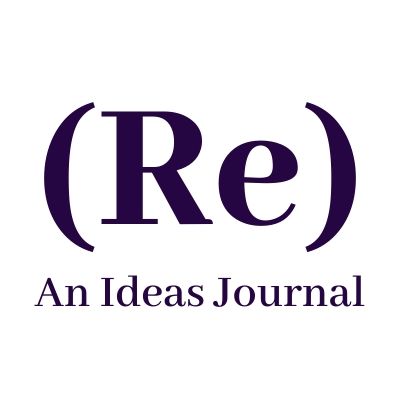Kali in Westray
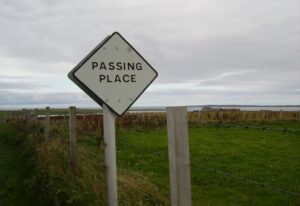
3.52: Focusing with perfect discipline on the succession of moments in time yields insight born of discrimination.
3.53: This insight allows one to tell things apart that, through similarities of origin, feature, or position, had seemed continuous. *
__________________
* Quotations are from the Yoga Sutras (attributed to Patanjali, circa 200-400 CE) comprised of 196 aphorisms, divided into four chapters, representing the first recorded comprehensive theoretical and practical guide to yoga. While the meaning and authorship of the Sutras are disputed, their evocative power is not.
A known facet of what we now refer to as “trauma space” is the stopping of time. Post-traumatic stress—when triggered—brings you back to the time of the trauma wherein there is no separation between a “then” and “now.” The only way to move out of this space is to focus “on the succession of moments in time” as Patanjali suggests. Then you can begin to tell them apart. But how to do this when seemingly stuck like glue inside one of these spaces? In May 2009, I found myself at one of these crisis points when working on my PhD, living alone for a month on the northwestern-most of the Orkney Isles in Scotland—Westray.
I had packed all my books and clothes in two large suitcases and managed to get to Gatwick Airport early where I waited on a long, glacial line to check in, only to be told when I finally arrived at a counter that my plane had already boarded. Long aggravating story short, after much gaslighting by various employees and so-called managers of British Airways, I had to purchase new tickets for the next day.
This delay meant that when I arrived on Westray to go to the West Manse, Sandy and Willie McEwan—my generous hosts who had renovated this old vicars’ home built in the 1500s, and were letting me stay at their house while they were in Shetland—would already be gone. Not only was I traveling alone, I would arrive alone. The only other time I had stayed with them, I was with a colleague who drove. I do not drive, and had no idea how I would get to the West Manse from the ferry.

My phone did not work during the crossing, so I had no way of contacting the nominal taxi, which at the time was not really a taxi, but a person named Graham with a car who could pick you up—maybe. A kind man on the ferry, who overheard my plight, offered to drive me to the Manse since he lived nearby. He also helped me carry in my many bags from the grocery store in Kirkwall on the main Orkney Island, purchased because I was not sure how I could get to the local shops in Pierowall, the village six miles from the West Manse.
I had fallen in love with Westray on a day trip from Kirkwall a few years earlier in June, the buttercups and the cows and the green and blue crystal clear seas and the puffins and Grobust Beach and the bunnies and hares that made it seem like Alice in Wonderland. I almost missed the ferry back, because the wind was against me as I cycled. I finally just got off the bike and started pushing it past the buttercup cow fields and thought, you know, I don’t care if I miss the ferry. My partner can send me my laptop, and I’ll just write my PhD here.

Fast forward three years later, and I am doing just that, at this Manse, set on a small rise overlooking where the Atlantic and North Sea meet, and Maes Sand, the white, sandy beach where I walk every day rain or shine, wind or calm—at times only to be pelted by sand like tiny hailstones—and still love it.
When I arrived at this stunningly beautiful location, it was raining and windy. That did not bother me at all because I had work to do, but as I unpacked my groceries into the massive kitchen, I realized I forgot the one thing I needed the most—milk. One of Sandy’s thoughtful notes alerted me to the fact that across the way was their son Sam and his family. I walked across the drive, feeling quite shy because I did not want to knock on their door and bother them, but Sam somehow materialized outside, and his wife Jill brought me a jug of milk, another example of McEwan generosity that held me even in their absence.

As I put out all my many books on the long dining room table with the view out to the Westray Firth, the water separating this island from the others, the tides so strong energy is being drawn from them now, I see what I am up against. I have to produce a draft manuscript of my PhD by the end of this month and the final version in July. I only have shards of writing from a research project that switched focus midway from purely academic to also including my theater practice, and therefore from 100K to 60K words, which as it turns out is harder, condensing what needs to be “original thought” into fewer words.
So, I was freaking out.
Whenever I walked out of the dining room, I would bring my laptop into the hallway and attach it to the broadband cord. There was no WiFi at that time that could penetrate the thick walls of the Manse. Out of desperation, I discovered online groups of people who like me were recovering from some type of addiction, be it alcohol, drugs, or people. In these virtual rooms I felt free to say how scared I was for real. I needed a witness outside of myself, because I was becoming not only an unreliable witness, but in my isolation—even with a calming view of the swirling waters of both ocean and sea and the ever-changing light and cloud shadow over distant islands—unspooling into an unreliable narrator.
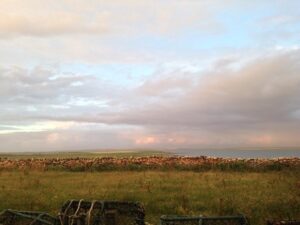
When I say scared, I don’t mean that almost pleasant feeling of oh, I’m a little scared, this will be thrilling. I mean shit-scared. As in can’t move scared. As in oh my God I’m going to die scared.
What was causing this level of trauma, you might reasonably ask since I was in a gorgeous house with a big ass kitchen and an incredible view, and even if Sandy and Willie were not there, their son and his family were across the way? Well, it was not some kind of Stephen King nightmare ax murderer scenario: it was the fact I would be seen. My words, the ones I was writing, would be read and judged. In 2000, I had already been through the PTSD sound barrier of having my first play seen and heard, which had led me to puke all night, so I could not show up, but then miraculously recovered after I heard on my voice mail that it had been given the thumbs up. But this was different. I had gone through a version of it even writing the initial proposal for the PhD.
The last time I had done any serious academic work—my undergraduate honors thesis in 1986—I had been blind drunk—as in mostly blacked out. I only have very hazy memories of writing it, but did give a draft scrawled on legal pads in barely legible handwriting to the theater secretary, who I paid to type it on her then-brand new “word processor.” Shockingly, it was awarded high honors. With the help of my spiritual advisor and best friend in 2004, I somehow managed to write the proposal, even though it required many revisions. As an American artist I had to do an intricate dance to translate my writing style into “British academic” in order to make it legible in the UK. A gaping chasm I did my best to cross, since they had given me a fellowship to do so.
But now here is the big one, the actual PhD dissertation (American)/thesis (British), now including my own “practice” (British)/”work”(American).

So, OK, I am terrified. Again. Of failing? Of being seen? Of being found wanting? Discovered as a fraud? Yes. All that. All of this tipping me back into old trauma, so that I cannot tell where I am from moment to moment, simultaneously an adult in a dining room in Westray watching the mist crawl closer and recede with the wind like breath in 2009, and a little girl, age three, in a room isolated with a scary new stepfather on an island in Maine in 1967—cloudy memories that I am feeling keenly in my body rather than seeing in the mind’s eye. For days the fear gets to the point of physical nausea and sharp stomach pains. I am having a kind of diarrhea as well, not related to any actual food source. A friend once described the process of writing a PhD as “eating a 25 pound bag of flour one teaspoon at a time,” and I think we can call that accurate. Any past traumas, especially involving abuse, will rise to the surface at some point in this process to try to bring you down with them.
When in one of the online recovery chat rooms, I meet a self-described witch from Australia who has been sober many years, she suggests I create a shrine of some kind. We talk during my night and her morning. I tell her I am into yoga, so as far as divinity goes, I probably need to go in that direction. She is cool with that, but says the image has to be female, an image that can give me strength.
After we talk, I search the Internet and come upon an image of Kali, which reminds me of an event a few years prior when She had come into my mind’s eye as a fierce protector who had warned me off a course of action that seemed altruistic but would have been self-destructive. Kali has many arms and usually is depicted with a skull under her foot. She is not warm and cuddly, but is incredibly effective at slaying enemies, internal or external. Even though the ferocity of Her image scares me, I print it out, because I know I need that power. I place Her in a corner of Molly, the name of my bedroom in the Manse, each room having been named after one of the three sisters who had lived there before the McEwans.
My online Australian witch friend had said I needed to give Kali gifts at Her shrine, so every day I collected wildflowers, shells, and little stones that I place in front of Her, careful to take any wilted blooms away. This ritual gave me the strength to move through the freak-out into the work, every day, little by little, until at the end of the month, I had a draft. A deeply imperfect draft I had to revise, but a draft.
I also meditated and prayed every morning, and did yoga, sometimes on the beach, where I walked every evening. The rest of the time, when not reading or writing at the dining room table, I drank coffee, ate lentil stew I had made in a huge pot so I would not have to cook every day, and made oatmeal for breakfast. Sometimes I cycled into the village to shop, which—depending on the direction of the wind—was either fun and exhilarating, or comically difficult. People looked out their car windows at me like I was mad. Which is understandable. When it would begin raining, I just laughed, because it was sad clown territory.
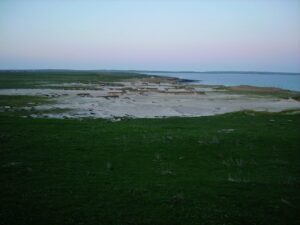
The advantage of all this crazy cycling is that at the end of a stressful month, I was in really good shape, which is not what one would consider the obvious outcome of freaking out while trying to draft a PhD.
What also kept me from going under was the sound of both the ocean (Atlantic) and sea (North), wind (all directions), birds (including oyster catchers, swallows, curlews, terns, seagulls, bonxies, kittiwakes, gannets, guillemots, and when I could cycle to them at Castle O’Burrian—a rock stack close to a gentle cliff edge covered in spongy green grass and thistles—puffins and fulmars).
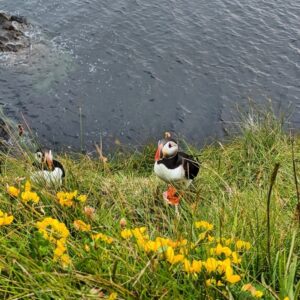
And of course the cycling itself. Because while it could be a colossal pain in the ass (literally), when cycling I was in my body, out in the wind, rain, sun, whatever. The opposite of trauma space—which is experienced as if past events are happening in that moment with no daylight between past and present—is full embodiment in the present. It is almost impossible not to be in the present while trying to cycle against a 30 mile per hour wind up a steep hill. Try it. You’ll see my point.
And then of course my daily walks to Maes Sand, that little stretch of sandy beach where my soul now lives, and I come and visit it whenever I can, and indeed am here right now, close by, as I type these words in 2019—in the Brotchie, the side house of the Manse, at the downstairs table, where I have the Yoga Sutras, coffee, daily reflection books, crystals, my phone, journals, notes about teaching yoga, pens, and a thermos from Kripalu where I trained to become a yoga teacher last month, some poems, a couple of stones from the beach, and a list of groceries I need to pick up.
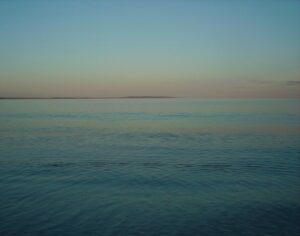
Kali can also mean “time” or “the fullness of time,” how it passes. In August 2009, archeologists discovered on Westray a Neolithic figurine of a female form, like they had never seen before—locals nicknamed her the Westray Wife. Archeologists have to work very carefully, digging out each layer with small instruments, drawing each square in a grid, marking territory. Archeological digs too are a form of meditation, a kind of yoga, a discovery of the succession of moments in time, discerning subtle differences in pieces of dirt and clay that may seem on the surface similar. While clearly it was the archeologists’ devoted work that led to the discovery, I like to imagine my shrine to Kali helped unearth this unexpected 5000-year-old divine female form, thereby both affirming the importance of this site, while also upending the preexisting story. She’s like that.
And I am now back in this beautiful place that somehow lives inside me even when I am not here. A place that has saved me again and again, that I had to fight to get back to and did.
My first word as an infant was wawa, my first sentence was I wanna go beach. Even as an infant I knew, I knew, I knew what I needed. The ocean and the beach. When I am here, I am home.
3.53: This insight allows one to tell things apart that, through similarities of origin, feature, or position, had seemed continuous.
Because this is not the old story of home that wants to capture me forever—no, this is a soul home, where it is possible to move outside of the sticky, seemingly eternal traumatic moment, to a new succession of moments, where I can move outside of old stories, into my life, my very own life.
Photos by Julia Lee Barclay-Morton
Julia Lee Barclay-Morton is an award-winning writer and theater director, produced and published internationally, most recently with an essay in Prairie Schooner (Winter 2020), and another forthcoming in Heavy Feather Review; chapbook published as winner of Nomadic Press Bindle Prize and her play On the edge of/a cure was produced by Rogue Players in NYC in 2019. Publications include Ohio Edit, NYTE, Prentice-Hall, Stockholm Review, Gertrude, The Other Stories, Burning House Press, and TL;DR. Residency at Vermont Studio Center and fellowship to Wesleyan Writers Conference. She founded Apocryphal Theatre in London, and was awarded a practice-based PhD at Northampton, UK, and BA with High Honors from Wesleyan University. Now back in NYC, she writes, makes art, coaches, teaches, and leads retreats to her favorite island in Scotland. “Kali in Westray” is part of a memoir-in-progress, interlacing her unorthodox healing path with Patanjali’s Yoga Sutras. Find her at TheUnadaptedOnes.com.
